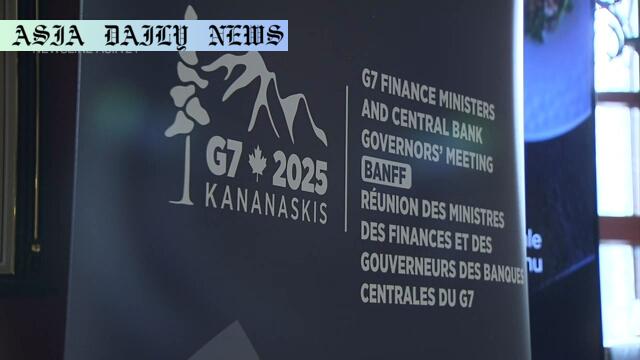G7 Tariffs – Group of Seven finance officials meet to discuss global impacts of US tariffs, economic sanctions, and China’s EV growth.
G7 finance ministers will meet in Canada to discuss US tariffs and their global economic impact.
Economic sanctions on Russia and China’s electric vehicle growth are also key agenda points.
Canada, as the chair, faces the challenging task of uniting G7 members for a joint statement in support of free trade.

Introduction: G7 Finance Officials Convene Amidst US Tariffs
The Group of Seven (G7) finance ministers and central bank governors are set to gather in Banff, Canada, to discuss critical global economic challenges. Dominating the agenda are the tariffs imposed earlier this year by the administration of US President Donald Trump, which have sparked a wave of uncertainty across global markets. Over the course of two days, officials will collectively evaluate the implications of these tariffs on the world’s economy and explore potential strategies to mitigate the fallout.
US Tariffs and their Global Fallout
The economic measures enacted by the United States, particularly tariffs targeting imports from multiple nations, have provoked significant discussion and condemnation from both allies and trade competitors. These tariffs, which are seen as protectionist, have stirred concerns over a potential trade war, threatening to upend decades of economic interdependence. In Banff, finance officials will analyze the tangible risks to global economies, including increased costs for goods, disrupted supply chains, and retaliatory measures that could compound instability.
Sanctions on Russia and Ukraine’s Ongoing Crisis
A key component of the discussions revolves around economic sanctions on Russia. The ongoing war in Ukraine continues to weigh heavily on G7 countries, with each government aiming to fine-tune sanctions that pressure Russia while minimizing the impact on their own economies. Coordinating a united response within the G7 remains paramount for Canada, the current chair, as member nations navigate complex geopolitical ramifications.
China’s Electric Vehicle Surge Raises Global Concerns
Another focal point of the discussions is China’s rapid export growth of electric vehicles (EVs), which has become a source of unease within Japan and European nations. Critics argue that overproduction and aggressive exports could destabilize global auto markets, compounding existing issues like overcapacity and pricing wars. The G7 seeks to understand these trends and assess how innovation and competition in EV production might be managed to ensure a fair and balanced market.
The Challenge of Promoting Free Trade
Canada’s significant task as the G7 chair is to navigate the array of differing perspectives among member countries and produce a consensus-driven statement reaffirming their support for free trade. Against the backdrop of rising protectionist measures and heightened economic nationalism, this objective will test the diplomatic acumen of G7 leaders. A unified stance could send a powerful message to the broader global community about the importance of open and fair economic policies, even in the face of adversity.
Conclusion: A Crucial Moment for Global Cooperation
The G7 gathering in Banff is taking place at a particularly critical juncture for global economic governance. With the shadow of US tariffs looming large, the discussions will reflect the growing need for international collaboration to address common economic challenges. Whether the G7 can emerge with a united strategy will be closely watched, as the outcomes of this meeting could shape the trajectory of global economics in the coming years.
Commentary
The Importance of Addressing Global Trade Dynamics
The upcoming G7 discussions in Banff, Canada, are a pivotal moment for global diplomacy, particularly in this era of economic uncertainty. The effects of US tariffs have rippled across world markets, sparking debates about the balance between national interest and global cooperation. Given the prominent role trade plays in fostering economic growth, these discussions offer a vital opportunity for finance leaders to reaffirm the significance of collaboration over competition.
How Economic Policies Highlight Broader Geopolitical Trends
Beyond economic concerns, the G7’s discussions also underscore broader political dynamics. The sanctions on Russia, for example, not only highlight a commitment to supporting Ukraine but also emphasize the strategic importance of united economic pressure. Similarly, concerns over China’s electric vehicle exports reflect the complex interplay between innovation, industrial policy, and market fairness. By addressing these challenges collectively, the G7 is sending a clear message about the value of coordinated decision-making in an increasingly interconnected world.
The Challenges of Finding Consensus
One of the most fascinating elements of this meeting will be observing how G7 leaders navigate their differing priorities to craft a coherent joint statement. With Canada at the helm, the task of aligning opinions—particularly on sensitive issues like tariffs—is no small feat. Success in achieving unity could set an important precedent for future crises, offering hope that even amidst divergent interests, cooperation remains achievable. As observers, we can only hope that this meeting proves fruitful in fostering not just resolutions but stronger partnerships.


